Lattice-Top Blueberry Pie
Makes One 9-inch Pie
Click here for a printable version of the recipe.
A woven lattice makes a striking top for a fruit pie, especially colorful fruit, such as blueberries; the open weave allows a peek at the filling and lets steam escape as the pie bakes. The process of weaving the top is easy to follow – cut the dough into strips, preferably with a fluted pastry wheel, and arrange them on top of the filling. This pie and many others with juicy berry fillings are thickened with cornstarch, which has stronger thickening properties than flour (a more appropriate choice for less juicy apples or pears). You may want to adjust the amount of thickener if the berries are particularly juicy, or if you prefer a firmer or looser pie filling.
All-purpose flour for dusting
Pâte Brisée (See crust recipe on next page)
2 pounds (about 7 cups) fresh blueberries, picked over and rinsed
1/2 cup granulated sugar
1/4 cup cornstarch
1/4 teaspoon ground cinnamon
1 tablespoon fresh lemon juice
1 large egg yolk, for egg wash
1 tablespoon heavy cream, for egg wash
Fine sanding sugar, for sprinkling
1. Preheat oven to 400°F. On a lightly floured surface, roll out 1 disk of dough to a 13-inch round, about 1/8 inch thick. Fit dough into a 9-inch pie plate.
2. In a large bowl, toss together berries, granulated sugar, cornstarch, cinnamon, and lemon juice until combined. Pour mixture into pie plate, piling in center.
3. On a lightly floured surface, roll out remaining disk of dough as in step 1. To make lattice, cut dough into ten 1-inch wide strips using a fluted pastry wheel. Lightly brush edge of dough in pie plate with water. Carefully arrange dough strips on top, weaving to form a lattice. Trim dough to a 1-inch overhang. Fold edges under as desired, and crimp with a fork. In a small bowl, whisk together egg yolk and cream for egg wash; brush on top of dough strips and edge of pie shell. Generously sprinkle with sanding sugar. Refrigerate or freeze pie until firm, about 30 minutes.
4. Transfer pie plate to a parchment-lined rimmed baking sheet, and bake until crust begins to brown, about 20 minutes. Reduce heat to 350°F. Continue baking until crust is deep golden brown and juices bubble, 55 minutes or more. (If crust browns too quickly, tent pie with foil). Transfer pie to a wire rack; let cool completely, at least 3 hours, before serving. |
|
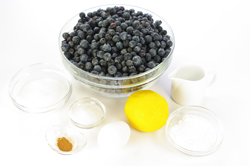
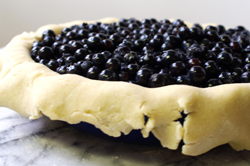
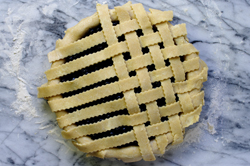
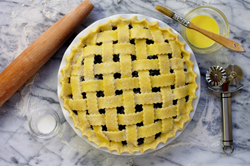
|
Pâte Brisée
The rich flavor, delicate texture, and versatility of pâte brisée have made it the standard at Martha Stewart Living and in this book, where it is used for pies and tarts both sweet and savory. From three main components – flour, fat, and water – plus a little sugar and salt, you get a crust that is incomparably flaky, yet sturdy enough to contain nearly any filling. An all-butter pâte brisée tastes best, but some cooks use shortening or lard for additional tenderness. The name pâte brisée means “broken pastry,” and refers to cutting the butter into the flour either by hand or with a food processor. The butter-flour mixture should resemble coarse meal, with some pieces of butter the size of small peas, before cold water is drizzled into it; these bits of unincorporated butter give pâte brisée its famously flaky texture by releasing steam as they melt.
2-1/2 cups all-purpose flour
1 teaspoon salt
1 teaspoon sugar
1 cup (2 sticks) cold unsalted butter, cut into small pieces
1/4 to 1/2 cup ice water
1. Pulse flour, salt, and sugar in a food processor (or whisk together by hand in a bowl). Add butter, and pulse (or quickly cut in with a pastry blender or your fingertips) until mixture resembles coarse meal, with some larger pieces remaining. Drizzle 1/4 cup water over mixture. Pulse (or mix with a fork) until mixture just begins to hold together. If dough is too dry, add 1/4 cup more water, 1 tablespoon at a time, and pulse (or mix with a fork).
2. Divide dough in half onto two pieces of plastic wrap. Gather into two balls, wrap loosely in plastic, and press each into a disk using a rolling pin. Refrigerate until firm, well wrapped in plastic, 1 hour or up to 1 day. (Dough can be frozen up to 3 months; thaw in refrigerator before using.) |
|
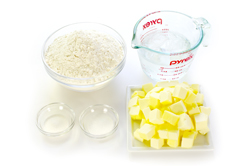
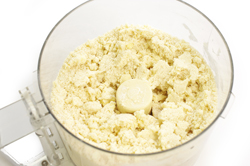
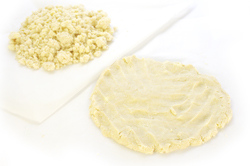
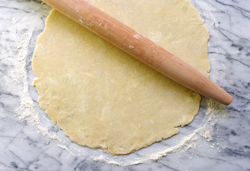
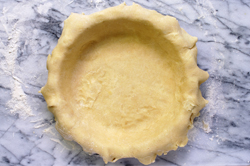
|

